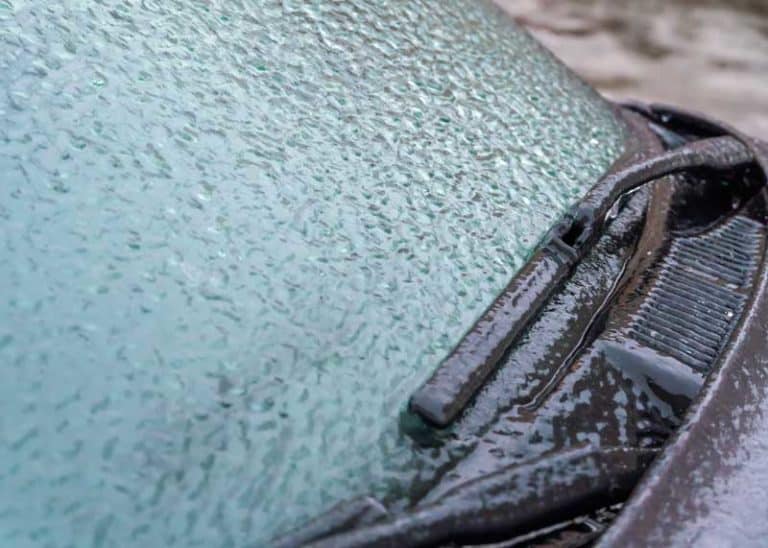How to Ground a Generator When Camping: Warnings & Requirements (13 Tips)
When do you need to ground your generator? You don’t want to start a fire or shock someone. In this guide, you’ll learn when you need to ground your generator, according to experts. And how to ground a generator when camping.
To ground your generator while camping, you’ll need a few supplies: an 8-ft copper rod, solid copper wire, and a ground clamp. You’ll also need a mallet to drive the rod and tools to connect the ground wire. Plus, you need to know what’s under the ground where you’ll install the ground rod.
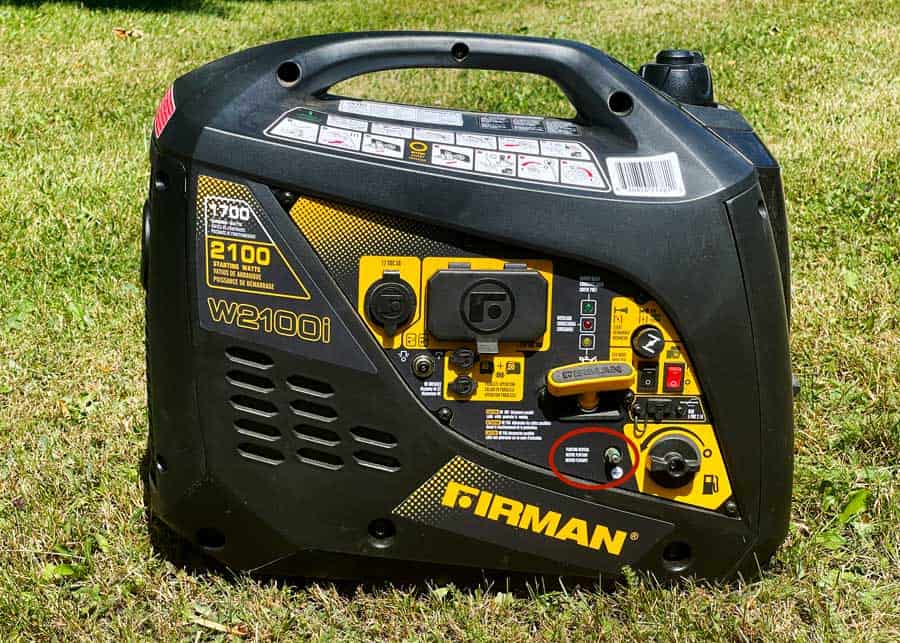
Please note: As we get started, I want to clarify one detail. I’m not an electrician and I don’t know the specific nuances of your setup (generator, application, environment). This article is a result of my research and experience. But you should always consult with a licensed professional. Never take chances with the safety of people or possessions.
Do I Need to Ground My Generator When Camping?
When camping, you probably don’t have to ground your generator.
The rules and recommendations vary depending on your state, province, and country. And what type of generator you have (bonded neutral vs floating neutral) and the application (extension cord only or wired to a panel or RV).
If you’re uncertain, it won’t hurt to ground your generator. Especially if you’re setting up a long-term RV hookup, installing a ground rod is a great idea. Of course, you should only pound a metal rod into the ground if you know what’s under the ground.
However, there are several variables to consider before starting your generator.
Here are three perspectives to consider.
1. Generac
According to Generac, one of the largest generator manufacturers, it depends on the application.
When using just the extension cords, you do not need to use a ground rod. (If you have a bonded neutral portable generator. This can be found in the owner’s manual.)
When connecting to an electrical panel (building electrical system, manual transfer switch, RV, etc.) you need to connect your generator to a ground rod.
Does the portable generator need to be grounded? Generac.com
So if you are going to run your portable generator with an extension cord and your generator is bonded neutral, no ground rod is required.
But if you are going to wire into a panel – including into your RV – you must ground the generator to a ground rod, pounded 8 feet deep.
2. Firman
Here is what the user manual for my Firman 2100W inverter generator (W01781) says.
The National Electric Code requires your generator must be properly connected to an appropriate ground to help prevent electric shock.
Warning: Failure to properly ground the generator can result in electric shock.
Firman Owner’s Manual: (W01781) 2100W inverter generator
So Firman’s position is to always ground, citing the National Electric Code in the United States.
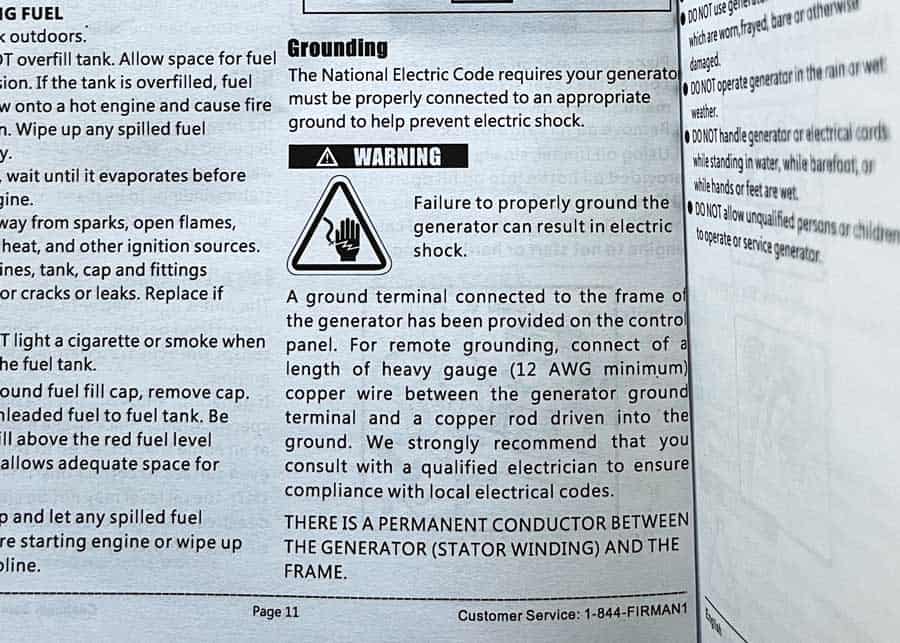
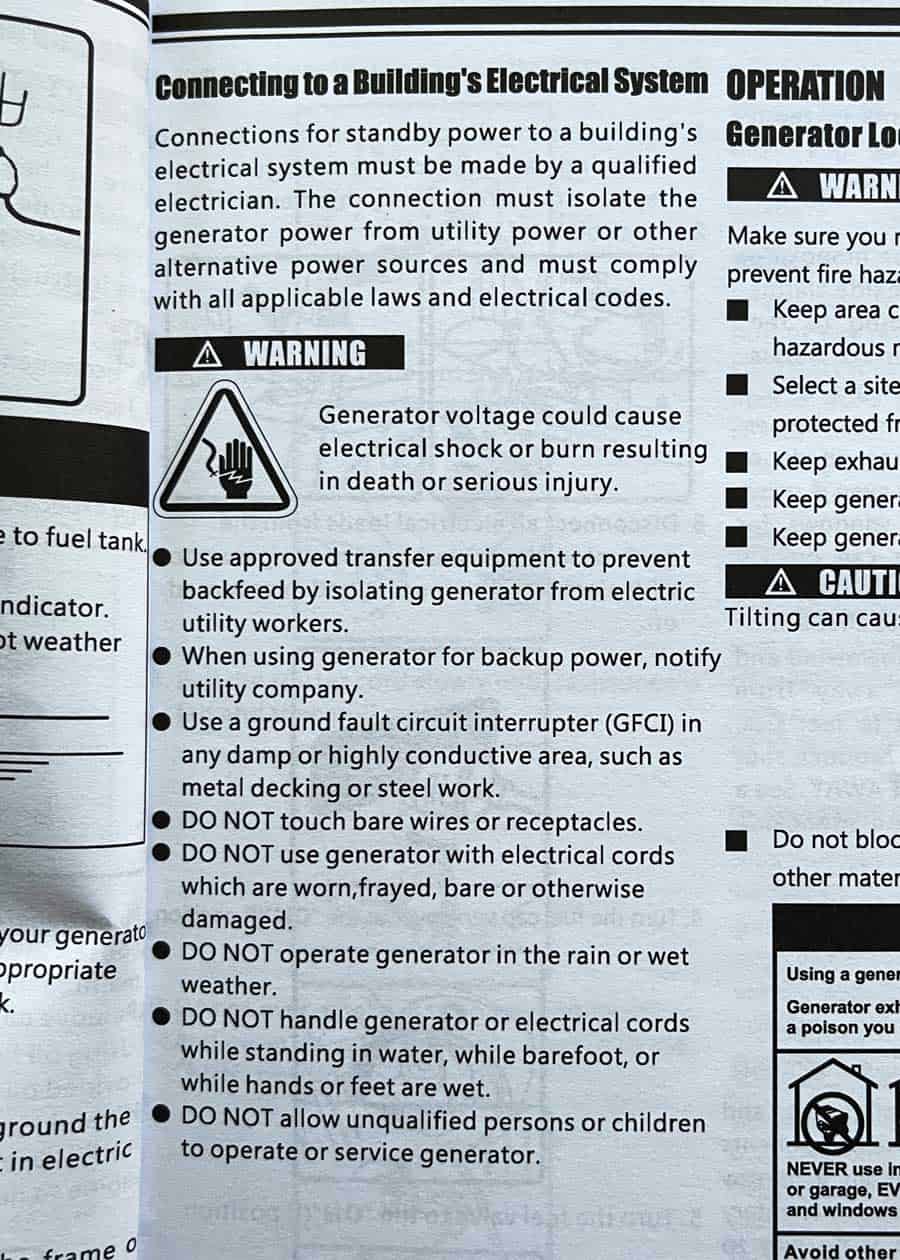
3. RV Travel
Mike Sokol makes a good point about grounding generators unnecessarily.
… could require a grounding rod connection in some circumstances, but that’s when powering your RV or home. So don’t go pounding in ground rods while camping. You don’t know what’s buried a few feet down in the earth (like a natural gas pipe, electric wire or digital phone service).
RVtravel
This warning is especially important when traveling and staying at public campgrounds.
If you don’t know what’s under the ground, it’s a bad idea to drive a 4 to 8-foot metal spike down there.
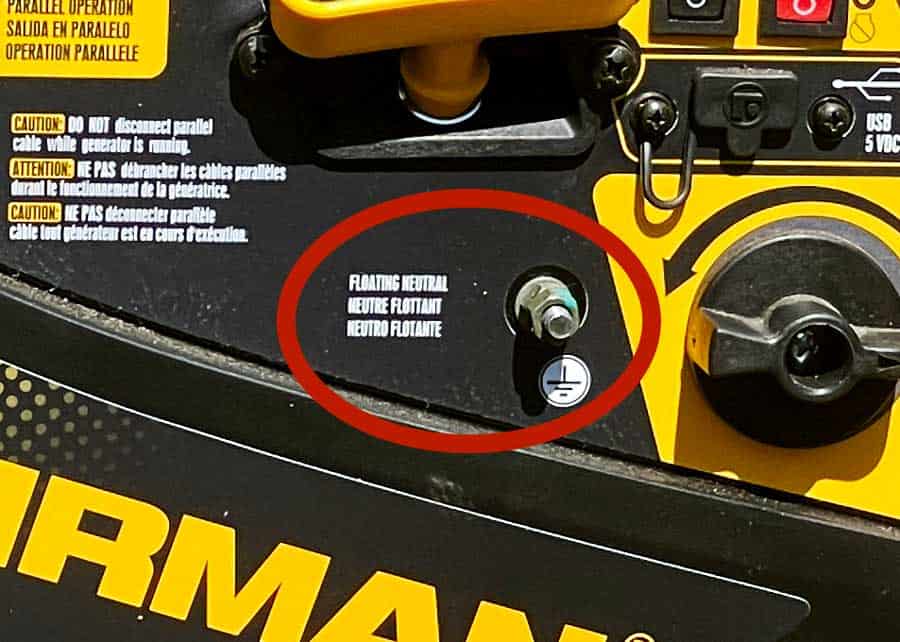
Floating Neutral vs Bonded Neutral
What’s the difference between a floating neutral vs a bonded neutral generator?
- Floating neutral generator: The neutral circuit isn’t connected to the frame of the generator or the ground.
- Bonded neutral generator: In contrast, the neutral circuit is connected to the generator’s frame.
Source: Electric Generators Direct
How to Ground a Generator When Camping: Steps & Tools
Grounding a generator gives a short circuit someplace to go instead of an appliance or person. By grounding it, you’re ensuring that if there’s a short circuit, that excess electricity will go into the ground, where it can do the least damage.
One rule of thumb is to read the manual for your generator. If you’re still unclear, it’s best to consult an expert.
Grounding a generator is a simple task that you don’t need anything fancy to accomplish—just a few steps, and you can enjoy your camping trip without worries. Let’s learn how to ground a generator when camping.
Tools and Equipment
You will not need any special tools for grounding your generator. You will probably already have some of them.
You can purchase the equipment and tools you don’t already have at your local hardware store. If you get bogged down by too many choices, ask an associate.
- 8-foot copper or copper-coated steel rod (minimum of 5/8in diameter)
- Solid copper wire: NEC compliant
- Grounding clamp
- Mallet or sledgehammer
- Wire strippers
- Pliers
- Adjustable wrench
The length, material, and diameter requirements might be different in your area. Always check local laws and codes before installing your ground rod.
6 Steps to Ground Your Generator
- Find a spot to bury the copper rod. Make sure the ground is soft but not extremely dry or sandy. Dry or sandy soil has poor conductivity. The best is a slightly damp spot.
- Use your mallet or sledgehammer to pound the rod into the ground. It needs to be at least 3 feet minimum into the dirt.
- Use the wire strippers to remove 6 to 12 inches of the insulation from the copper wire.
- Twist the stripped ends of the copper wire around the grounding rod, tightening it with the pliers.
- Find the grounding terminal bolt on your generator. Make sure the generator is off before you complete this step. Next, strip the insulation off approximately 2 inches of the other end of the copper wire. Next, loosen the nut, wrap the bare ends of the copper wire around the bolt, and tighten with the pliers as you did on the other end. Then tighten the nut back up.
- Check all the connections to ensure they’re all secure and tight.
7 Tips for Installing Ground Rod
- When you pound the copper rod into the ground, go straight down. If you’re putting it into rocky soil, go at a 45-degree angle.
- Try to avoid soggy soil. Lightly damp is the best; you certainly don’t want to put your grounding rod into a puddle. You might also want to ensure you’re not putting it somewhere that will become a puddle midway through your camping trip.
- Read the manual for your generator before hooking anything up or making any decisions.
- The generator is the grounding tool if you only use your portable generator to run some small appliances or even a space heater. In that case, the metal frame of the generator must be touching the ground – all the grounding required.
- Check with state and provincial laws regarding generators and grounding rods. States can have specific rules for these types of situations.
- Avoid using your vehicle chassis to ground your portable generator. Even if you find yourself without a grounding rod, don’t attach the copper wire to your car chassis. The chassis isn’t earth grounded.
- Always be safe rather than sorry. Check with an expert, ideally a licensed electrician if you are working beyond your knowledge level.
6 Portable Generator Safety Tips
There are some essential safety tips to keep in mind when using a generator. The ones that apply to using a generator while camping are as follows:
- Keep your generator dry. Keep it under a canopy so that it doesn’t get rained on.
- Do not stand in a puddle when using the generator.
- Carbon monoxide fumes can be life-threatening, and generators emit carbon monoxide in their exhaust. Therefore do not keep a generator in a tent, RV, trailer, or other building. A generator must be away from buildings or rooms where people sleep or congregate.
- Ensure you don’t place your generator near windows where carbon monoxide can enter the building.
- Shut down the generator and allow it to cool completely before adding fuel. Fuel spilled on a hot generator can cause a fire.
- Store fuel for your generator away from it; do not leave fuels close by a generator.
If you are unable to get your generator set up successfully, here are 6 ways to heat a camper without electricity.
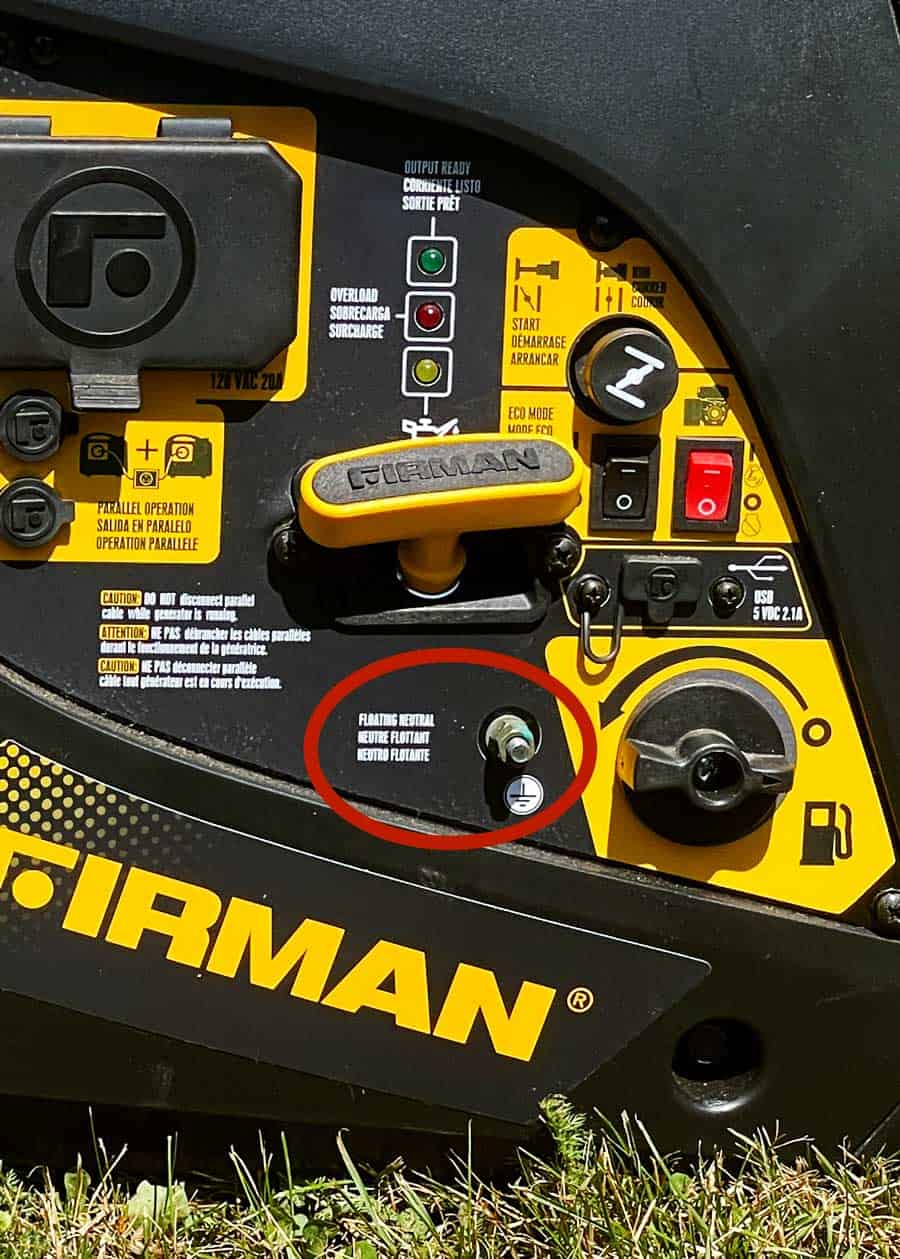
Now you know how to ground a generator when camping. But keep a few things in mind before you go camping.
- First, do you need a generator, or will you rough it and use a propane camping stove and firelight or candles to light your way?
- Second, a generator is a way to go if you have a brand-new RV or camping trailer that you’re dying to try out.
Now you must decide what you will power with that generator, what kind of generator you will purchase, etc.
There are a lot of factors involved in camping with a generator. Do your homework and know what your options are. Best of all, have fun camping!
More reading: 9 Easy Tips to Quiet a Generator
Your Turn
When do you ground your generator? Do you ground your generator when camping? Please share your experience and tips in the comment section below.



